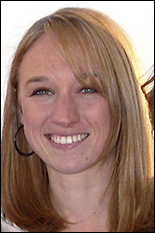Twomey Wins Wylie Fellowship
Fischell Department of Bioengineering (BioE) graduate student Julianne Twomey, advised by BioE associate professor and associate chair Adam Hsieh, has been awarded an Ann G. Wylie Dissertation Fellowship. The fellowship, created for students who are in the final stages of writing their dissertations, includes a stipend of $10,000, candidacy tuition remission and financial assistance toward the cost of health insurance. Twomey, who earned her B.S. in mechanical engineering with a specialization in biomedical engineering from the University of Delaware in 2008, conducts her research in Hsieh's Orthopaedic Mechanobiology Lab, where she explores the feasibility of stem cell therapies for the regeneration of compressive load bearing tissues, such as cartilage and intervertebral discs. While adult human mesenchymal stem cells can be prompted to differentiate into new, healthy chondrocytes (cartilage cells), their use in patients suffering from conditions such as osteoarthritis and degenerative disc disease has been hampered by the inability to control their response to the mechanical environment into which they are transplanted. Twomey is investigating how stem cells can be genetically engineered to respond in the desired, therapeutic way to their mechanical environment. In order to accomplish this, she says, the way cells “feel” and interact with their micromechanical environment needs to be understood. "When human mesenchymal stem cells become specialized chondrocytes during a process called chondrogenesis, they create a thin pericellular matrix, a coating around themselves consisting mainly of two proteins, type VI collagen and decorin," she explains. "The matrix has a dual role as both a biomechanical and biochemical transducer that converts mechanical stimuli into biochemical signals. It controls the amount of mechanical load that deforms the chondrocyte as well as its intracellular signaling response, and modulates the assembly and aggregation of other proteins. My aim is to examine the roles of type VI collagen and decorin in the chondrocyte response to mechanical loads." By inserting a piece of genetic material called small hairpin RNA (shRNA) into the mesenchymal stem cells' genome, Twomey has been able to interrupt the molecular signals responsible for producing type VI collagen and decorin during chondrogenesis. The targeted removal of the proteins from the pericellular matrix's structure, and subsequent observation of the cells' behavior, shed light on how they develop and function under different mechanical stress conditions. Her research will demonstrate how this novel approach can be used to engineer mesenchymal stem cells toward a desired functional response, present a molecular analysis of mechanosignaling, and provide insight into overcoming practical issues encountered in tissue engineering and regenerative medicine. Twomey chose to attend the Clark School after meeting Hsieh and learning more about his work. Since joining the Graduate Program in Bioengineering, she has been recognized for her work as a budding educator as well as her scientific work: in 2012, she received the UMD Center for Teaching Excellence Distinguished Teaching Assistant Award. She currently mentors two undergraduate members of Hsieh's research group, Ben Bulka and Kenny Rosenberg, both of whom contribute to related research in which they study the short- and long-term effects of mechanical stimulation and molecular signaling.
Related Articles: April 26, 2013 Prev Next |


